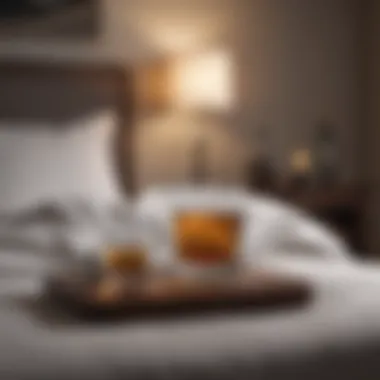The Impact of Alcohol on Sleep Quality and Health


Intro
Alcohol consumption is a prevalent aspect of many cultures, often intertwined with social activities, celebrations, and personal routines. Many people may not consider how alcohol affects sleep quality and the sleep cycle. Understanding this relationship is essential for fostering good health. This article unpacks the ways in which alcohol impacts sleep, examining both immediate effects on the individual and potential long-term health implications.
Research Overview
Summary of Key Findings
Recent studies have shown that alcohol significantly affects various stages of sleep. Initially, it may induce sleepiness, but the quality of sleep deteriorates as the night progresses. Alcohol disrupts rapid eye movement (REM) sleep, a phase essential for cognitive functions and emotional regulation.
- Alcohol decreases total sleep time. Individuals consuming alcohol may fall asleep faster, but they often wake up more often during the night.
- Sleep architecture is harmed. REM sleep, crucial for memory consolidation, is often curtailed, which contributes to reduced overall sleep quality.
- Physiological mechanisms are involved. Alcohol affects neurotransmitters, leading to changes in brain activity during sleep.
- Long-term implications include sleep disorders such as insomnia, as well as increased risks for mental health issues and chronic diseases.
Relevance to Current Scientific Discussions
The relationship between alcohol and sleep quality is of growing interest among researchers. Discussions have focused on how various drinking patterns—such as binge drinking or regular consumption—affect sleep health. Moreover, there is increasing attention toward how alcohol-induced sleep disturbances may impact mental health, potentially leading to depression and anxiety disorders. This complexity makes it a relevant subject in the fields of psychology, sleep medicine, and public health.
Methodology
Research Design and Approach
Studies tend to employ various research methods to assess the impact of alcohol on sleep. Longitudinal studies often track participants over time to evaluate changes in sleep patterns and mental health correlates with drinking habits.
Data Collection and Analysis Techniques
Data collection typically involves both self-reported measures and objective sleep assessments. Self-reporting can include questionnaires on sleep quality and alcohol consumption. Objective measures may use polysomnography or actigraphy for assessing sleep stages and disturbances. Statistical analyses help derive correlations between alcohol intake and sleep disruptions, aiding in understanding the broader implications for health.
The exploration of the alcohol-sleep nexus is not merely a topic of academic interest; it possesses profound significance in real-world applications, guiding public health messages and individual choices. The intertwining of lifestyle with sleep health warrants informed discussions and thoughtful actions.
Prelims
The topic of alcohol and its impact on sleep is critical in understanding both our behaviors and health. In recent years, the relationship between these two areas has gained significant attention. Studies show that alcohol can affect the quality and duration of our sleep. This is relevant not only for those who consume alcohol but also for healthcare professionals, students, and educators who seek to comprehend this complex interplay.
Understanding how alcohol impacts sleep involves considering various factors. These include the type of alcohol consumed, the amount, and the timing of consumption. Each element plays a role in determining sleep quality and the overall health of individuals. Disruptions in sleep can lead to broader health consequences, making this relationship even more significant.
Exploring the underlying mechanisms is also vital. When alcohol enters the body, it interacts with various neurotransmitters that regulate sleep. This chemical interaction affects the architecture of sleep itself, potentially leading to fragmented or shallow sleep phases.
The need for awareness about lifestyle choices is another essential aspect. Many people may not realize how their drinking habits affect their sleep patterns. By understanding these connections, individuals can make more informed decisions regarding alcohol consumption and sleep hygiene.
As the science continues to evolve, it becomes clearer that this topic is both relevant and necessary for modern society. Awareness can lead to better strategies for managing alcohol consumption and enhancing sleep quality, thus supporting overall health.
"Understanding the nexus of alcohol and sleep is imperative for improving public health outcomes and individual well-being."
In summary, this introduction sets the stage for an in-depth examination of the relationship between alcohol and sleep. It highlights the need for further exploration and understanding, making it a pertinent subject in today's society.
Defining Sleep and Its Importance
Sleep is a vital component of human health and wellbeing. It is essential for physical restoration and mental clarity. Without sleep, both cognitive function and physical health can deteriorate. Understanding the nature of sleep helps us grasp its importance, especially in the context of alcohol consumption.
The sleep cycle consists of several stages, each vital for certain brain and bodily functions. This includes the transition from light sleep to deep sleep, followed by rapid eye movement (REM) sleep. The body repairs tissues, regenerates cells, and reinforces memories during these stages.
In the realm of sleep, quality matters as much as quantity. High-quality sleep is associated with enhanced mood regulation, better memory, and increased productivity during waking hours. Typically, adults require seven to nine hours of sleep, but it greatly varies among individuals.
We should also note that alcohol disrupts this critical cycle, impacting the body’s ability to perform restorative functions. This disruption can lead to various health issues, emphasizing the importance of the relationship between alcohol and sleep.
"Sleep is not an escape, but a crucial period for playing out the demanding tasks of life, where the mind and body undergo significant processes that shape our health."
In summary, defining sleep and understanding its features is crucial for anyone examining the impact of lifestyle choices, like alcohol consumption, on health and well-being. A basic comprehension empowers individuals to make informed decisions concerning their habits.
Types of Alcohol and Their Composition
Understanding the types of alcohol and their composition is essential for comprehending how they affect sleep. Not all alcoholic beverages are created equal, and their distinct properties can influence sleep patterns in various ways. Each category of alcohol has unique effects on the body, which can directly impact the quality of sleep. Alcohol consumption affects the sleep cycle markedly, and the type consumed can amplify or mitigate these effects. Thus, it is crucial to analyze the different categories of alcohol to gauge their potential impact on sleep.
Alcohol Categories
Alcoholic beverages can be classified into several categories based on their fermentation process and alcohol content. The main types include:
- Beer: This is generally lower in alcohol content, ranging from about 4% to 6%. Beer is made from fermented grains and, typically, its consumption might initially promote relaxation. However, excessive drinking can lead to adverse effects on sleep quality.
- Wine: With a typical alcohol content between 9% and 16%, wine can also have sedative properties. Yet it is important to note that wines contain tannins, which might affect some individuals differently, influencing their sleep experience.
- Spirits: These beverages, such as whiskey, vodka, or rum, usually contain 20% to 50% alcohol by volume. The higher concentration can lead to quicker onset of sleepiness, but can also cause disruptions in later sleep stages.
- Liqueurs: These are sweetened spirits that can contain various flavoring agents. They typically have a lower alcohol content than spirits but still pose risks for sleep when consumed in larger quantities.
Each type of alcohol offers different compounds and metabolized products in the body that may play a role in sleep disruption. Knowledge of these categories will help to understand the overall effect on sleep patterns and behavior.
Toxicological Aspects of Alcohol
The toxicological effects of alcohol are substantial, especially in the context of sleep. Ethanol, the active ingredient in alcoholic beverages, has several impacts on the central nervous system. Through both acute and chronic use, alcohol can lead to:
- Impaired neurotransmitter function related to sleep regulation.
- Increased production of certain hormones that disturb the sleep cycle.
- Affected absorption of nutrients essential for quality sleep, particularly magnesium and vitamins.
Furthermore, when alcohol is metabolized, it produces byproducts like acetaldehyde that are toxic and may contribute to sleep disturbances. These toxic effects can accumulate over time and potentially lead to more severe health issues, making it critical to consider the long-term implications of alcohol use on sleep.
"Alcohol, while initially sedating, can lead to complex disturbances of sleep architecture." – Sleep Research Institute


Mechanisms of Alcohol’s Effect on Sleep
Understanding the mechanisms by which alcohol affects sleep is crucial for comprehending the overall relationship between these two entities. Alcohol interacts with various biological systems and can lead to significant alterations in sleep quality and architecture. It is important to address both neurotransmitter systems and the broader structure of sleep itself. Knowledge in this domain can inform better lifestyle choices and health practices for individuals concerned with their sleep quality.
Impact on Neurotransmitters
Alcohol has a profound influence on neurotransmitters - the chemical messengers in our brain that regulate sleep, mood, and cognition. When alcohol is consumed, it enhances the effects of gamma-aminobutyric acid (GABA), a primary inhibitory neurotransmitter. This increase creates a calming effect, allowing individuals to feel relaxed and subsequently fall asleep more easily. However, this initial sedative effect can be misleading. Over time, reliance on alcohol for sleep can lead to shifts in neurotransmitter balance.
Reduction in the production of other neurotransmitters, such as serotonin and melatonin, follows consistent alcohol consumption. These neurotransmitters play significant roles in regulating sleep cycles. For instance, melatonin is crucial for the sleep-wake cycle, signaling the body when it is time to sleep. Disruption of these chemical signals can result in an inconsistent sleep pattern and reduced sleep quality.
Additionally, the impact of alcohol on dopamine levels - another key neurotransmitter - can aggravate the sleep disruption. Studies indicate that chronic alcohol use may alter the brain's reward pathways, contributing to negative effects on mood and sleep.
This interplay of neurotransmitters shapes how alcohol consumption can create a façade of healthy sleep while concealing deeper disruptions that manifest later.
Influence on Sleep Architecture
Sleep architecture refers to the structure and pattern of sleep cycles, typically divided into non-REM and REM stages. Alcohol consumption notably disturbs this architecture. During the first part of the night, when its sedative effects are strongest, alcohol can increase non-REM sleep duration while simultaneously reducing REM sleep.
REM sleep is particularly important. It plays a vital role in memory consolidation and emotional regulation. Therefore, a reduction in REM sleep can lead to deficits in cognitive functions and heightened emotional instability. Over time, chronic disruptions to sleep cycles often culminate in persistent fatigue and cognitive impairment.
As the body processes alcohol, the initial sedative effects diminish, often leading to frequent awakenings and fragmented sleep. This interruption not only disrupts the sleep cycle but also impedes the progression through various sleep stages. Both the quantity and quality of sleep suffer as a result.
In summary, alcohol's influence on neurotransmitter systems and sleep architecture creates a complex interaction that can lead to long-term negative consequences for sleep health. It is essential for individuals to recognize that while alcohol may facilitate sleep onset, it does not equate to restorative sleep.
Short-Term Effects of Alcohol on Sleep Quality
Alcohol consumption directly influences sleep quality in the short-term. Understanding this effects can help individuals make informed choices regarding their drinking habits. The relationship is critical as many people often overlook how their alcohol intake can disrupt sleep patterns, affecting overall health and well-being. It’s not just the quantity of alcohol consumed that matters but also the timing and individual tolerance levels. Awareness of these factors can provide a framework for addressing sleep issues related to alcohol use.
Initial Sedative Effects
Initially, alcohol has a sedative effect on the body. Many individuals consume it for relaxation, believing it aids in falling asleep more quickly. The reason lies in alcohol's ability to enhance the activity of gamma-aminobutyric acid (GABA), a neurotransmitter that inhibits brain activity. As a result, this increase in GABA can lead to feelings of drowsiness and ease the onset of sleep. For some, this effect is perceived as beneficial, as it can mitigate feelings of stress and help initiate sleep more rapidly.
However, it is important to note that while alcohol facilitates falling asleep, this initial sedative phase does not equate to healthy or restorative sleep. Over time, alcohol use can lead to a paradox where individuals may find it harder to achieve deeper sleep stages, ultimately compromising sleep quality. It is critical to acknowledge that the relief sleep might be temporary, as repeated use can lead to dependence on alcohol for sleep.
Disruption of REM Sleep
The impact of alcohol on sleep architecture is significant, especially in disrupting REM (Rapid Eye Movement) sleep. REM sleep is essential for cognitive processes, emotional regulation, and learning. Studies indicate that alcohol reduces the amount of REM sleep experienced, especially during the first half of a sleep cycle. As the night progresses, individuals may suffer from a rebound effect, where they experience more REM sleep after alcohol is metabolized. This disruption can lead to fragmented sleep and reduced overall sleep quality.
The ramifications of reduced REM sleep extend beyond mere fatigue the following day. Individuals may face difficulties in memory retention and emotional stability. Stress and anxiety can increase, affecting mental well-being.
"While alcohol may seem like a quick solution to sleep issues, the cost to sleep quality and overall health can be significant."
In summary, the short-term effects of alcohol on sleep quality highlight a duality. Alcohol may assist with falling asleep but at the risk of deeper, more restorative sleep. Recognizing these patterns is essential for anyone concerned about the impact of their drinking habits on their sleep health.
Long-Term Implications of Alcohol on Sleep Patterns
Understanding the long-term implications of alcohol consumption on sleep patterns is essential for both individuals and health professionals. As alcohol becomes a regular part of one's lifestyle, its impact on sleep can become chronic. Disrupted sleep quality over an extended period can lead to various negative health outcomes.
Research indicates that long-term alcohol use can contribute to the onset of sleep disorders. These disorders often exacerbate existing issues, creating a vicious cycle that can be difficult to break. The benefits of assessing this link include understanding potential health risks and facilitating pathways to better sleep management for those affected.
In this section, we will explore specific sleep disorders associated with alcohol use and chronic insomnia, alongside the implications of dependency on healthy sleep patterns.
Sleep Disorders Associated with Alcohol Use
Alcohol has been linked to multiple sleep disorders. These include sleep apnea, insomnia, and parasomnias. Each disorder has unique features and implications for health, but they share a common thread of being exacerbated by alcohol consumption.
- Sleep Apnea
- Insomnia
- Parasomnias
- Alcohol relaxes the muscles in the throat. This relaxation can lead to increased chances of airway obstruction during sleep.
- Individuals with sleep apnea may experience frequent awakenings, reducing their overall sleep quality.
- Those who use alcohol as a sleep aid may find themselves developing insomnia. This happens when the body adjusts to the sedative effects of alcohol over time, leading to dependence.
- Alcohol can initially induce sleep but often leads to fragmented sleep cycles later in the night.
- Consumption of alcohol can trigger or worsen parasomnias, such as sleepwalking or night terrors. These episodes can be unsettling and dangerous for the individual and others nearby.
The association between alcohol and these disorders sheds light on the importance of moderation in consumption and the consideration of healthier alternatives for sleep.
Chronic Insomnia and Dependence
Chronic insomnia can develop as a side effect of persistent alcohol use. Individuals may turn to alcohol as a means to cope with stress, anxiety, or night-time awakenings, believing it to be a solution. This pattern does not address the underlying issues. Instead, it can lead to dependence.
- Dependence often develops insidiously. It starts with using alcohol to aid sleep. Over time, larger quantities may be needed to achieve the same effect, leading to a cycle of consumption.
- This dependence further entrenches insomnia, as the body becomes reliant on alcohol rather than naturally falling asleep.
- Returning to baseline natural sleep patterns without alcohol can be a challenging process for individuals in this situation.
Long-term implications extend beyond just poor sleep; chronic insomnia can lead to physical and mental health issues, such as anxiety, depression, cardiovascular problems, and impaired cognitive function. Interventions may be necessary to break this cycle, underscoring the need for a comprehensive approach to sleep that addresses both the direct effects of alcohol and the psychological factors at play.
"Chronic insomnia linked to alcohol dependence requires mindful intervention to break the cycle and restore healthy sleep patterns."
By focusing on these insights, it becomes evident that the relationship between alcohol and sleep can pose significant health risks. Understanding these implications helps individuals make informed decisions about their lifestyle choices.
Timed Alcohol Consumption and Sleep Outcomes


The timing of alcohol consumption plays a critical role in determining its effects on sleep quality and overall health. This section will explore how the timing of alcohol intake interacts with various aspects of sleep, emphasizing benefits and considerations that are relevant to understanding this complex relationship.
Effects of Timing on Sleep Onset
The timing of alcohol intake can significantly influence sleep onset. Consuming alcohol close to bedtime might initially seem to facilitate sleep due to its sedative properties. However, the repercussions are more nuanced. Studies show that while alcohol may help induce sleep faster, it can disrupt the natural sleep cycles later in the night. This disruption leads to fragmented sleep, especially as the alcohol effects wear off.
When examining sleep onset, it is important to understand the role of different sleep stages. Alcohol primarily affects the REM stage, which is crucial for restorative sleep. If alcohol is consumed too late, it can lead to a decrease in total REM sleep, resulting in feeling less refreshed upon waking.
Here are some key points regarding the influence of timing on sleep onset:
- Alcohol can reduce the time it takes to fall asleep but may compromise sleep quality.
- The closer the alcohol consumption is to bedtime, the greater the chance of disrupted sleep cycles.
- The potential benefits of taking alcohol for sleep generally diminish as the timing of consumption shifts closer to sleep.
Relative Order of Drinking and Sleeping
The sequence of drinking and sleeping also has implications for sleep outcomes. When alcohol is consumed in moderation hours before sleeping, some studies suggest that it may have a less disruptive effect on sleep than binge drinking right before bed. Optimal timing can allow for the body to metabolize alcohol, reducing its adverse effects by the time sleep occurs.
- Moderate consumption, spaced out from sleep, seems to offer a more sustainable approach.
- This can prevent a quick depletion in sleep quality that is common with late-night drinking.
- Awareness of one’s drinking habits also plays a role, as individual differences in metabolism can further complicate these outcomes.
In summary, the interplay between timed alcohol consumption and sleep outcomes is multifaceted. Timing is essential in addressing how alcohol intake influences sleep quality. Both the effects of timing and the relative order in which alcohol is consumed in relation to sleep can be pivotal in determining whether an individual benefits from alcohol or suffers negative sleep consequences.
Gender Differences in Alcohol's Impact on Sleep
Understanding how gender influences the effects of alcohol on sleep is essential in exploring the relationship between these two factors. Given that biological and social aspects differ markedly between men and women, these differences can significantly alter how each gender responds to alcohol consumption and its subsequent impact on sleep quality. This section aims to dissect the nuances behind these differences, revealing how gender shapes the experience of sleep disturbances related to alcohol use.
Biological Factors
Biological aspects play a crucial role in the way alcohol affects sleep across genders. Primarily, physiological variations such as body composition, hormone levels, and genetic factors contribute to these differences.
For instance, women typically have a higher percentage of body fat than men. This difference impacts the distribution and metabolism of alcohol in the body. Since alcohol is water-soluble and less soluble in fat, women may experience stronger effects from the same amount of alcohol compared to men. The metabolism of alcohol is also influenced by hormonal fluctuations, particularly in women, where menstrual cycles can affect both alcohol tolerance and sleep patterns. For example, women may find that alcohol-induced sleep disturbances are more pronounced during certain phases of their cycle.
Moreover, research indicates that neurotransmitter systems involved in sleep regulation may respond differently to alcohol between genders. While both men and women can experience altered neurotransmitter activity due to alcohol, the degree and the specific neurotransmitters affected can vary. Understanding these biological factors is vital for developing gender-specific recommendations regarding alcohol use and sleep management.
Alcohol Metabolism Variability
Variability in alcohol metabolism is another essential consideration in discussing gender differences. The enzyme activity crucial for breaking down alcohol, specifically alcohol dehydrogenase, differs between men and women. On average, men have higher levels of this enzyme, allowing them to metabolize alcohol more efficiently than women. As a result, women often retain a higher blood alcohol concentration after consuming identical amounts of alcohol, leading to prolonged sedative effects and potential sleep disruption.
Furthermore, genetic differences regarding alcohol metabolism can contribute to disparities in how individuals experience sleep after drinking. Some women may carry genetic variations that affect their processing of alcohol, leading to increased sensitivity. This particular sensitivity can result in heightened sleep disturbances or long-term sleep issues compared to their male counterparts.
The Role of Mental Health in Alcohol and Sleep Interaction
The connection between mental health and the effects of alcohol on sleep is significant. Individuals dealing with stress, anxiety, and depression often find that their sleep quality deteriorates. Simultaneously, these same mental health challenges can lead to increased alcohol consumption. This creates a cycle that is difficult to break and affects overall health.
Stress and Anxiety Dynamics
Stress and anxiety are common issues in modern life. They can cause restlessness and lead to sleep disturbances. Individuals experiencing high levels of stress might turn to alcohol as a method of coping. While alcohol may provide temporary relief, it ultimately disrupts sleep patterns.
- Increased Heart Rate: Stress can lead to an elevated heart rate, making it harder to fall into a restful sleep. Alcohol, initially a depressant, actually increases heart rate and might not assist in achieving deeper sleep stages.
- Heightened Cortisol Levels: Stress raises cortisol, a hormone that can disrupt sleep. Alcohol consumption might initially lower cortisol but can lead to disturbances later in the night, contributing to insomnia.
- Impact on Anxiety Disorders: For those with anxiety disorders, using alcohol as a sleep aid can exacerbate symptoms, leading to a paradoxical increase in anxiety after the effects of alcohol wear off.
"Understanding the intertwining nature of alcohol consumption and mental health can inform better strategies for improving sleep quality."
Depression and Sleep Patterns
The relationship between depression and sleep is complex. Many individuals with depression report difficulties in sleep, such as insomnia or hypersomnia. Alcohol is frequently utilized as a form of self-medication, primarily to numb emotional pain. However, the long-term effects on sleep are more detrimental than beneficial.
- Sleep Fragmentation: Alcohol consumption can lead to fragmented sleep. Those battling depression may already struggle with sleep continuity, and alcohol worsens this by causing night awakenings and less time spent in restorative sleep stages.
- Mood Fluctuations: Regular alcohol use affects the brain's chemistry. It can exacerbate symptoms of depression, creating a feedback loop where poor sleep quality leads to worse mood regulation, increasing the likelihood of consuming more alcohol.
- Hormonal Imbalances: The use of alcohol can interfere with hormones that regulate sleep such as melatonin. For individuals with depression, an already disrupted hormonal system further complicates sleep issues.
In summary, mental health plays a crucial role in understanding how alcohol interacts with sleep. Those who experience stress and depression need to address both mental health and alcohol consumption to improve sleep quality and overall well-being.
Cultural and Societal Influences on Drinking and Sleep
Understanding cultural and societal influences on drinking and sleep is crucial in exploring their intricate relationship. Alcohol consumption does not occur in a vacuum; it is deeply embedded in the fabric of society, shaped by various norms and practices. These influences play a significant role in drinking behaviors and subsequently affect sleep quality and patterns.
Cultural contexts can dictate the types of alcoholic beverages consumed, the occasions for drinking, and the amount typically considered acceptable. In some cultures, drinking is a daily activity, while in others, it is reserved for special events. Such social norms enable common practices that lead to varied levels of alcohol consumption across different settings. For instance, cultures that promote moderate drinking might result in improved sleep outcomes compared to societies that condition excessive consumption.
Furthermore, seasonal and regional factors also influence drinking habits. For example, during holidays or festivals, alcohol consumption usually spikes, potentially disrupting sleep for many individuals. This disruption can be attributed to the timing and volume of alcohol intake, which collectively influence overall sleep quality.
Another aspect to consider is how social media and popular culture perpetuate drinking behaviors. Images and narratives around drinking can encourage people, especially younger audiences, to partake in behaviors that may negatively impact their sleep. The pressure to conform to perceived social norms regarding alcohol consumption can lead to binge drinking sessions that drastically compromise sleep architecture.
Social Norms and Alcohol Consumption
Social norms serve as unwritten rules that dictate behaviors within various communities. This phenomenon significantly affects alcohol consumption patterns. Celebrations, such as weddings or graduations, often feature alcohol consumption as a central activity. In such scenarios, drinking is not just common; it is expected. The strong influence of group dynamics can create a culture of drinking, where individuals may feel compelled to drink more than they usually would.
Research indicates that increased alcohol consumption, especially when it occurs late in the evening, can lead to poorer sleep quality. Those who regularly participate in social drinking may experience a persistent cycle of disrupted sleep due to alcohol’s sedative effects, followed by restless nights. This cycle can ultimately affect daily functioning and long-term health outcomes.
It is also essential to recognize that societal attitudes towards alcohol vary significantly. In some societies, abstaining from alcohol might be stigmatized, while in others, it might be seen as a virtue. These attitudes invariably lead to different patterns of alcohol-related behaviors, which resonate with sleep quality and factors contributing to insomnia or other sleep disorders.
The Role of Sleep Hygiene in Society
Sleep hygiene refers to practices and habits that promote quality sleep. It is a principle that is gaining traction in societies emphasizing wellness and self-care. However, its relationship with alcohol consumption is often overlooked. Poor sleep hygiene can be compounded by drinking habits, leading to negative health implications.


In many societies, education around sleep hygiene is often limited. This knowledge gap can undermine individuals' ability to recognize how drinking affects their sleep. Increasing awareness about good sleep hygiene can encourage healthier drinking patterns. For example, promoting the idea of having a cutoff time for alcohol consumption prior to sleep can lead to better sleep outcomes.
Sleep hygiene practices include maintaining a consistent sleep schedule, creating a restful environment, and avoiding stimulants before bed. When integrated into societal frameworks, these practices provide a roadmap for improving sleep quality in those who consume alcohol.
As sleep hygiene becomes more valued, addressing its interplay with alcohol consumption will be pivotal. If societies place importance on better sleep practices, it can influence their drinking behaviors and lead to healthier lifestyle choices overall.
As we explore the connections between social variables and individual health, it is crucial to foreground how societal understanding of sleep hygiene can shape drinking habits and in the long run, lead to improved sleep health.
By considering both cultural norms and societal attitudes towards alcohol consumption and sleep hygiene, it becomes evident that these factors are interlinked. Alcohol’s impact on sleep is not merely a biological issue; it transcends into sociocultural realms that define how individuals behave and ultimately, how well they sleep.
Research Findings and Current Studies
Research on the relationship between alcohol and sleep quality is essential. Understanding this connection helps in comprehending broader health implications and lifestyle choices. Current studies illuminate how various patterns of alcohol consumption affect sleep stages, architecture, and overall health outcomes. Accumulating evidence depicts alcohol not as a mere sedative, but a compound that complicates and disrupts sleep.
Key Studies Linking Alcohol and Sleep
Numerous studies illustrate the complex interplay between alcohol intake and sleep disruption. For instance, a study conducted by the National Institute on Alcohol Abuse and Alcoholism found that even modest drinking can lead to impaired sleep quality. Researchers noted that participants who consumed alcohol experienced less restorative sleep. This effect was particularly pronounced in individuals consuming alcohol close to bedtime.
Another significant study showcased through publications in journals such as "Sleep Medicine Reviews" detailed how chronic alcohol use correlates with an increased risk of sleep disorders, including insomnia and sleep apnea. A longitudinal study highlighted that individuals with alcohol dependence frequently report fragmented sleep patterns. They often encounter difficulties in reaching deep sleep stages, which are crucial for effective rest and recovery.
“Alcohol does not provide genuine sleep; it simply alters the landscape of sleep stages.”
Emerging Trends in Research
Recent research trends highlight nuances often overlooked in earlier studies. One area of focus is the role of timing in alcohol consumption. Studies, like those published in the "Journal of Clinical Sleep Medicine", have begun emphasizing how the timing of alcohol intake can significantly influence sleep outcomes. For example, drinking earlier in the evening may lead to better sleep quality than drinking just before sleeping.
Another emerging trend looks at the potential protective factors related to sleep hygiene practices among alcohol consumers. For instance, integrating regular exercise and cognitive-behavioral interventions may lessen the negative effects of alcohol on sleep. Additionally, research indicates an increasing interest in understanding how genetic factors influence alcohol metabolism and sleep architecture. This approach may pave the way for personalized recommendations in managing sleep health.
Shifting perspectives on alcohol's impact based on new findings encourages a reevaluation of public health approaches. As studies continue to emerge, the significance of balanced consumption and informed choices in mitigating sleep issues becomes more apparent.
Practical Implications and Recommendations
Understanding the relationship between alcohol and sleep provides valuable insights for individuals looking to enhance their sleep health. This section focuses on practical implications and recommendations to address the issues related to alcohol consumption and its effects on sleep quality. The insights here aim to inform students, researchers, educators, and professionals about effective strategies that can mitigate the negative consequences of alcohol on sleep.
Managing Alcohol Consumption for Better Sleep
Alcohol’s sedative properties can make it tempting to use it as an aid for sleep. However, the short-term benefits often lead to long-term complications. Thus, managing alcohol intake is crucial for preserving sleep quality.
- Moderation: Consuming alcohol in moderation is key. The Centers for Disease Control and Prevention (CDC) define moderate drinking as up to one drink per day for women and up to two drinks per day for men. This limit helps reduce the risk of sleep disruptions.
- Timing: Consider when alcohol is consumed. It is advisable to avoid drinking close to bedtime. This practice can prevent the disruption of the sleep cycle and allow the body ample time to metabolize alcohol.
- Alcohol-Free Days: Implementing alcohol-free days each week can help reset the body’s natural rhythms, leading to improved sleep over time. This strategy not only enhances sleep but can also improve overall well-being.
- Awareness: Individuals should be aware of the specific types of alcohol they consume. Different drinks have varying effects on the body and on sleep. For example, beverages with high sugar content may affect sleep quality more negatively than those without.
Keeping these managing strategies in mind enables a healthier relationship with alcohol while also promoting better sleep quality.
Integrating Healthy Sleep Habits
In addition to managing alcohol intake, adopting healthy sleep habits is essential. These habits can amplify the positive effects of reducing alcohol consumption on overall sleep quality.
- Consistent Sleep Schedule: Maintaining a consistent sleep schedule by going to bed and waking up at the same times daily aligns the body’s internal clock. This predictability can improve the ability to fall and stay asleep.
- Relaxation Techniques: Incorporating relaxation techniques such as deep breathing, meditation, or gentle yoga before bed can make a notable difference in enhancing sleep quality. Reducing stress levels, especially in the hours leading up to sleep, counters the negative impacts of both alcohol and anxiety on restfulness.
- Optimal Sleep Environment: Creating a conducive sleep environment is crucial. This includes ensuring a dark, quiet, and cool room. A good mattress and comfortable bedding also play a vital role in promoting quality sleep.
- Sleep Hygiene Education: Engaging in sleep hygiene education can empower individuals to make informed decisions. Knowledge about factors affecting sleep, including those related to dialogue about alcohol and its implications, contributes to an improved sleep repertoire.
Integrating these healthy habits creates a synergistic effect that not only helps in managing alcohol consumption but also enriches the overall quality of sleep.
"A well-planned approach to understanding and mitigating alcohol's impact on sleep can lead to significant improvements in sleep health and well-being."
The Future of Research on Alcohol and Sleep
The exploration of alcohol's impact on sleep is still in its early stages. Continued research is crucial for a comprehensive understanding of this relationship. New findings might lead to better interventions for individuals facing sleep disturbances due to alcohol use. The evolving landscape of sleep medicine opens doors for innovative treatments and preventive strategies.
Evolving Perspectives on Sleep Medicine
Sleep medicine is shifting towards a more integrative approach. Traditional perspectives focused primarily on diagnosing sleep disorders in isolation. However, understanding the role of lifestyle factors, like alcohol consumption, is gaining traction. This integration will enhance the overall treatment of these disorders. Current studies are beginning to critique long-held assumptions about alcohol’s role in sleep management.
By examining alcohol alongside other factors, clinicians can develop tailored treatment plans. Personalization is becoming a key trend in sleep medicine. The implications of alcohol’s effects on sleep could reshape how sleep disorders are managed long-term. With more evidence, recommendations will evolve, paving the way for improved patient outcomes.
Future Directions in Sleep Research
Research must continue to expand on various dimensions of alcohol and sleep. Specific areas to focus on include the following:
- Neurobiological Mechanisms: Understanding how alcohol influences neurotransmitter functions related to sleep regulation.
- Longitudinal Studies: Investigating the long-term effects of alcohol consumption on sleep patterns and health outcomes.
- Impact of Moderation: Examining how moderate drinking might differ in effects when compared to heavy consumption.
- Sleep Quality Metrics: Developing objective measures that accurately assess the impact of alcohol on sleep quality.
- Cultural Contexts: Recognizing how cultural attitudes towards drinking affect sleep and health behaviors.
Research in these areas promises to deepen our understanding of this complex relationship. The findings could have significant implications for public health strategies and individual lifestyle choices.
End
The relationship between alcohol consumption and sleep is an area of great importance, especially considering its implications on health and well-being. Understanding how alcohol affects sleep helps individuals make informed decisions about their drinking habits. Poor sleep can lead to various health issues, including impaired cognitive functioning, weakened immune response, and increased risk of chronic diseases.
This article outlines significant factors that contribute to the complexity of this relationship. By examining elements such as the timing of alcohol intake, types of alcoholic beverages, and individual differences in metabolism, we gain insight into how these aspects influence sleep quality and architecture. Additionally, the inclusion of mental health dynamics, gender differences, and sociocultural aspects allows for a holistic view of the interaction between alcohol and sleep.
Effective management of alcohol consumption can lead to better sleep outcomes. Strategies discussed in this article emphasize the importance of moderation and awareness of personal limits.
Importance of References
- Evidence-Based Insights: References allow us to anchor our findings in reality. For instance, studies can illustrate how alcohol alters sleep architecture or affects neurotransmitters, offering a clear picture based on data.
- Contextual Understanding: Without references, it is easy to generalize or misinterpret findings. Citing specific studies ensures that the complexities of alcohol’s impact on sleep are presented accurately and in context.
- Staying Current: The landscape of sleep research is constantly evolving. Updated references provide the latest findings, helping to inform best practices around alcohol consumption and sleep hygiene.
- Facilitating Further Research: For students, educators, and professionals, references serve as a gateway for further exploration. They provide pathways to additional reading and inquiry, fostering a deeper understanding of the subject.
Specific Elements to Consider
- Diversity of Sources: Incorporating a range of references, from clinical studies to meta-analyses, enriches the discussion. Each type offers unique perspectives and findings that contribute to a holistic view.
- Quality Over Quantity: It is essential to prioritize reputable sources that have undergone rigorous peer-review processes. This adds reliability and reduces the influence of misinformation.
- Accessibility: Ensuring that references are accessible to the audience is crucial. Incorporating resources from well-known platforms, such as research databases or academic publications, makes findings more usable.
"Quality references are the backbone of any academic discourse, providing an avenue for understanding and implications that go beyond surface-level insights."



